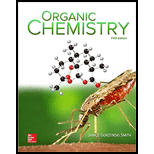
Concept explainers
(a)
Interpretation: The structure of stereoisomer that has higher melting point than eleostearic acid is to be drawn.
Concept introduction: Fatty acids are of two types: saturated fatty acid and unsaturated fatty acid. In Saturated fatty acid, double bond is absent, whereas unsaturated fatty acid consists of one or more than one double bond. The melting point of a fatty acid indirectly depends upon the number of double bond present in an acid. Higher is the number of double bonds in acid, lower will be the melting point of an acid.
When two higher priority groups are present on the opposite side then it is an
(b)
Interpretation: The structure of stereoisomer that has lower melting point is to be drawn.
Concept introduction: Fatty acids are of two types: saturated fatty acid and unsaturated fatty acid. In Saturated fatty acid, double bond is absent, whereas unsaturated fatty acid consists of one or more than one double bond. The melting point of a fatty acid indirectly depends upon the number of double bond present in an acid. Higher is the number of double bonds in acid, lower will be the melting point of an acid.
When two higher priority groups are present on the opposite side, then it is an
Trending nowThis is a popular solution!

Chapter 10 Solutions
PKG ORGANIC CHEMISTRY
- In the decomposition reaction in solution B → C, only species C absorbs UV radiation, but neither B nor the solvent absorbs. If we call At the absorbance measured at any time, A0 the absorbance at the beginning of the reaction, and A∞ the absorbance at the end of the reaction, which of the expressions is valid? We assume that Beer's law is fulfilled.arrow_forward> You are trying to decide if there is a single reagent you can add that will make the following synthesis possible without any other major side products: 1. ☑ CI 2. H3O+ O Draw the missing reagent X you think will make this synthesis work in the drawing area below. If there is no reagent that will make your desired product in good yield or without complications, just check the box under the drawing area and leave it blank. Click and drag to start drawing a structure. Explanation Check ? DO 18 Ar B © 2025 McGraw Hill LLC. All Rights Reserved. Terms of Use | Privacy Center | Accessibilityarrow_forwardDon't use ai to answer I will report you answerarrow_forward
- Consider a solution of 0.00304 moles of 4-nitrobenzoic acid (pKa = 3.442) dissolved in 25 mL water and titrated with 0.0991 M NaOH. Calculate the pH at the equivalence pointarrow_forwardWhat is the name of the following compound? SiMe3arrow_forwardK Draw the starting structure that would lead to the major product shown under the provided conditions. Drawing 1. NaNH2 2. PhCH2Br 4 57°F Sunny Q Searcharrow_forward
- 7 Draw the starting alkyl bromide that would produce this alkyne under these conditions. F Drawing 1. NaNH2, A 2. H3O+ £ 4 Temps to rise Tomorrow Q Search H2arrow_forward7 Comment on the general features of the predicted (extremely simplified) ¹H- NMR spectrum of lycopene that is provided below. 00 6 57 PPM 3 2 1 0arrow_forwardIndicate the compound formula: dimethyl iodide (propyl) sulfonium.arrow_forward
 Organic ChemistryChemistryISBN:9781305580350Author:William H. Brown, Brent L. Iverson, Eric Anslyn, Christopher S. FootePublisher:Cengage Learning
Organic ChemistryChemistryISBN:9781305580350Author:William H. Brown, Brent L. Iverson, Eric Anslyn, Christopher S. FootePublisher:Cengage Learning
